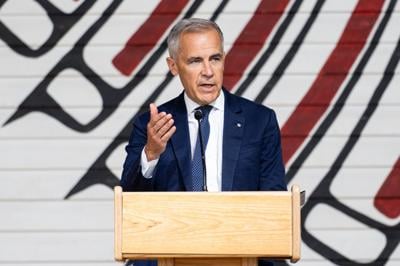GATINEAU — A summit between hundreds of First Nations representatives and the Liberal government about its major projects law began Thursday with Prime Minister Mark Carney’s insistence that Ottawa and Indigenous people are on equal ground.
“The economic value of these projects will be shared with First Nations as partners,” Carney told First Nations chiefs at the Canadian Museum of History, while other delegates tuned in virtually.
“In many respects, this is the first federal legislation to put Indigenous economic growth at its core,” the prime minister added.
Carney was touting the Building Canada Act, part of a contentious piece of legislation, known before its passage as Bill C-5. The law, a response to Canada’s trade crisis with the United States, was rammed through Parliament last month and would grant Ottawa temporary powers to sidestep existing environmental laws and regulations to spur the development of “nation-building” projects like pipelines, ports and mines.
The law, and its rushed passage, sparked a deluge of concerns from critics that it could compromise Indigenous rights and environmental protections.
By the end of the daylong confab, which saw Carney and a coterie of his ministers and caucus members meet with First Nations leaders, the prime minister’s vision of a partnership was met with cautious optimism and outright distrust.
The closed-door summit started with government officials allowing media to attend Carney’s opening speech, before hustling reporters out of the Gatineau, Que. venue despite a desire from First Nations leadership to let the public to hear from chiefs as well.
“I’m sorry you’re all out here. We should have been in (there), and you should have been able to hear my speech,” Assembly of First Nations (AFN) National Chief Cindy Woodhouse Nepinak told reporters outside the museum.
Woodhouse Nepinak’s comments came as criticisms emerged from a number of chiefs that the event’s agenda was not developed in collaboration with First Nations.
“This summit is a political theatre: last-minute invitations, last-minute agendas, no advisers have been allowed,” said Phyllis Whitford, Chief of O’Chiese First Nation, at a news conference on Parliament Hill.
“This legislation creates regulatory chaos. It will lead to more court battles, not fewer. It will scare away investors because it strips away legal certainty as well. The danger of legitimizing a flawed process, as we are currently (doing) in participating in this summit, would lend legitimacy to an illegitimate process,” said Kehewin Cree Nation Chief Vernon Watchmaker at the same news conference.
The final agenda for the gathering featured several sessions moderated by more cabinet ministers than chiefs, with the final session, titled “Working Together,” led by Carney and six members of his front bench. The sessions covered areas including the Indigenous Advisory Council that will be struck to ensure national-interest projects are chosen in tandem with rights-holders, and First Nations economic prosperity.
Woodhouse Nepinak said that while she appreciated the significance of a prime minister agreeing to sit down with First Nations in this way, she also wanted Carney to “come up with some commitments” by the end of the day.
Other demands raised by chiefs Thursday included reviving a bill that expired before the election ensuring clean water in First Nations communities, developing further efforts to close the First Nations infrastructure gap that has left communities lacking essentials like schools, homes and roads, and putting a renewed focus on First Nations policing services.
Before Carney’s morning speech, which saw about a third of the nearly 300 attendees rise as he took to the stage, the prime minister told reporters that his job was to listen.
When asked whether he felt he would reach a consensus with First Nations representatives about the law, he said, “Yes, I do.”
Derek Nepinak, chief of Pine Creek First Nation, said he saw on Thursday the “ambitious aspirations of a new federal government,” but that being “strong at home means working with the people here, and the people here are us.”
He echoed concerns shared by others that some chiefs granted speaking time were those with a history of supporting federal projects.
“That’s all well and good,” he said. “But what we need to see also is the people who are more critical and less optimistic about what these opportunities bring.”
Trevor Mercredi, the Grand Chief of Treaty 8 First Nations of Alberta, said at the conclusion of the gathering that the Carney government signalled its openness to hearing proposals on resource revenue-sharing with First Nations by promising to hold meetings on the subject.
“The prime minister has moved in a way that really concerns our chiefs. But within all of this movement, there is opportunity for him to fix what’s wrong and to fix the past issues,” Mercredi said.
Other leaders, like Chief of the Ojibways of Onigaming Jeff Copenace, said Carney committed to more regional consultation, but that he needs to pair that with “tangible investments in social infrastructure.”
“I’m not sure if he really understands the gap that exists in the country right now,” Copenace said.
“We’re hearing from the prime minister that he’s committed, that, again, no projects will go forward without First Nations consultation and accommodation. And on the other hand, he’s saying that we’re going to build all these projects and we’re going to build them immediately and as fast as we can. And so it’s not clear to me, how do you achieve that?”
Indigenous Services Minister Mandy Gull-Masty, a former grand chief of the Grand Council of the Crees, told reporters that the “willingness has to be there” from Indigenous communities for chosen projects to proceed.
Gull-Masty was joined by Crown-Indigenous Relations Minister Rebecca Alty, who said the next step in implementing the legislation will be to set up a Major Project Office, which will house the still-unformed Indigenous Advisory Council, by Labour Day.
Summits with Inuit and Métis groups are expected to be held in the near future.
Error! Sorry, there was an error processing your request.
There was a problem with the recaptcha. Please try again.
You may unsubscribe at any time. By signing up, you agree to our terms of use and privacy policy. This site is protected by reCAPTCHA and the Google privacy policy and terms of service apply.
Want more of the latest from us? Sign up for more at our newsletter page.


































To join the conversation set a first and last name in your user profile.
Sign in or register for free to join the Conversation